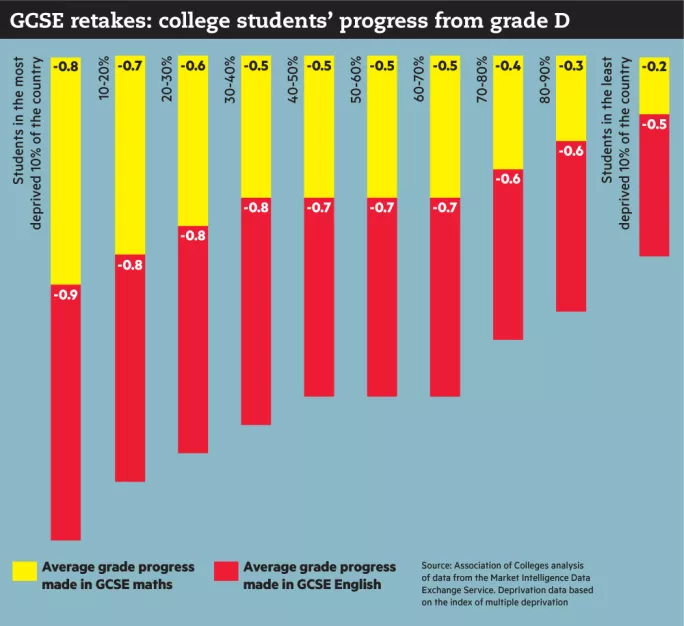GCSE resits ‘hit poorest students the hardest’

College students from the most deprived parts of the country make the least progress in GCSE English and maths resits, TES can reveal.
New analysis of this summer’s results by the Association of Colleges (AoC) shows that, on average, college students who had previously achieved a D grade in the subjects saw their grades drop after resits. And the decrease was most pronounced among students from the poorest parts of the country.
AoC chief executive David Hughes said that the current system - in which students without a C grade in either subject are required to retake it - “disadvantages students from deprived areas the most”.
In maths, results for students from the 10 per cent most deprived parts of England dropped on average by 0.8 of a grade - four times as much as in the least deprived areas. The pattern was similar in English: in the most deprived areas, students scores dropped by an average of 0.9, compared with 0.5 in the least deprived areas (see graphic, below).
The AoC analysis also reveals that in maths, students’ grades tended to deteriorate more as time went on. Among 16-year-olds who previously achieved a D, scores dropped by an average of 0.4 of a grade; at 18, the drop had more than doubled to 0.9 of a grade.
‘Positive pathway’ needed
The research found that overall drops in grades were significantly smaller among students taking IGCSEs, which the AoC said supported the view that a “new, more respected and positive pathway for young people who do not achieve the GCSE” was needed.
“We can see from the figures that the current system isn’t working for everyone and clearly disadvantages students from deprived areas the most,” Mr Hughes told TES. “Colleges are working extremely hard on this, helping to successfully motivate the thousands of students who are required to retake GCSE English and maths…We want the whole education system to support every young person to build confidence and achieve better literacy and numeracy skills, and that requires changes to the current policy.”
In 2015-16, it became a condition of colleges’ funding that any 16-19 students who had achieved a D grade in maths or English while at school should resit the qualification.
Consequently, this summer the overall number of GCSE entries among students aged 17 and over in the two subjects increased by about a third to more than 300,000. The A*-C pass rates in English and maths dropped to 26.9 per cent and 29.5 per cent respectively.
We can see from the figures that the current system isn’t working for everyone and clearly disadvantages students from deprived areas the most
The analysis comes as pressure is growing on the government to rethink resits. Last month Paul Joyce, Ofsted’s deputy director for FE and skills, told the UKFEchat conference in London that Ofsted’s annual report in December would examine whether “GCSE is the right qualification for everybody”.
A report by the Skills Commission also asked the Department for Education to consider whether a modular GCSE or functional skills qualification should be allowed as an alternative to normal GCSEs.

At Walsall College, 1,600 students sat English and maths last summer, and the total is expected to rise to 2,000 next year, according to deputy principal Fazal Dad.
For a three-day period in the summer, every single member of staff at the college was asked to assist with the GCSE exams.
Mr Dad told TES that the college discovered a number of maths learners had been “hothoused” at school. This allowed them to “scrape” a D grade, but their true level of understanding was actually far lower.
“No one is calling for this,” he said. “Employers aren’t saying they won’t employ someone without a C, universities aren’t turning students down because of this. It’s absurd and is just demotivating learners.”
At the AoC annual conference next week, Mr Hughes will launch a consultation with members on how colleges believe the resits system should be changed.
A DfE spokesperson said that “thousands more students are continuing to study maths and English GCSEs each year”. She added: College- and school-leavers who achieve their GCSEs significantly increase their chances of securing a good job, an apprenticeship or progressing to further learning.
“We are working closely with the post-16 sector to address the issues that are holding back the progress of students in securing the basics of maths and English, and we’re investing in support for FE colleges to improve results.”
You need a Tes subscription to read this article
Subscribe now to read this article and get other subscriber-only content:
- Unlimited access to all Tes magazine content
- Exclusive subscriber-only stories
- Award-winning email newsletters
Already a subscriber? Log in
You need a subscription to read this article
Subscribe now to read this article and get other subscriber-only content, including:
- Unlimited access to all Tes magazine content
- Exclusive subscriber-only stories
- Award-winning email newsletters